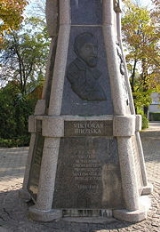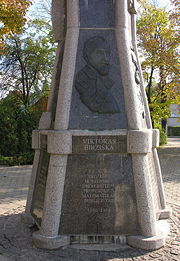
Viktoras Biržiška
Encyclopedia
Viktoras Biržiška was a Lithuania
n mathematician, engineer, journalist, and encyclopedist of noble extraction. His brothers were Mykolas Biržiška
and Vaclovas Biržiška
.
. He studied mathematics and engineering at the University of St. Petersburg in Russia
between 1904 and 1908, and later at the Saint Petersburg State Institute of Technology
from 1909 to 1914.
After completing his studies, he was appointed a director at a munitions factory in St. Petersburg from 1914 to 1920. He was imprisoned by the Bolsheviks and only returned to Lithuania following a prisoner exchange. While in Vilnius
he taught at the Lithuanian High School, worked with the Committee for the Liberation of Vilnius, and edited Lithuanian newspapers in both the Polish and Russian languages. As a result of his activities he was arrested for treason by the Polish authorities on February 5, 1922 and was almost shot. Through the intervention of the League of Nations
, he was exiled to Lithuania together with his brother Mykolas Biržiška
and thirty-one other Lithuanians and Belarusians
.
His activities in Vilnius during the years of 1920-1922, and his struggle with the Polish authorities are elaborated upon in his book Neužgijusios Žaizdos (Open Wounds), 1936, 2nd ed. 1967
He held the position of Professor of Mathematics and Chief of the Mathematical seminar at Vytautas Magnus University
, and later from 1940-1944 at Vilnius University
. When the Red Army re-invaded Lithuania in 1944, he went into exile in the West. He worked as a professor at the Baltic University
, founded in Hamburg
, and later moved to Pinneberg
. In 1950 he emigrated to the U.S.
, and resided in Chicago until his death.

Memoirs:
Lithuania
Lithuania , officially the Republic of Lithuania is a country in Northern Europe, the biggest of the three Baltic states. It is situated along the southeastern shore of the Baltic Sea, whereby to the west lie Sweden and Denmark...
n mathematician, engineer, journalist, and encyclopedist of noble extraction. His brothers were Mykolas Biržiška
Mykolas Biržiška
Mykolas Biržiška , a Lithuanian editor, historian, professor of literature, diplomat, and politician, was one of the twenty signatories of the Act of Independence of Lithuania....
and Vaclovas Biržiška
Vaclovas Biržiška
Vaclovas Biržiška was a Lithuanian attorney, bibliographer, and educator.He was a member of a notable Lithuanian family; his great-grandfather Mykolas Biržiška was a representative in the Sejm when the Constitution of 3 May was accepted in 1791; his grandfather Leonardas Biržiška was an active...
.
Biography
He was the youngest of the three Biržiška brothers, sons of Antanas and Elžbieta Biržiska, all who contributed significantly to the Lithuanian National RevivalLithuanian National Revival
Lithuanian National Revival, alternatively Lithuanian National Awakening , was a period of the history of Lithuania in the 19th century at the time when a major part of Lithuanian inhabited areas belonged to the Russian Empire...
. He studied mathematics and engineering at the University of St. Petersburg in Russia
Russian Empire
The Russian Empire was a state that existed from 1721 until the Russian Revolution of 1917. It was the successor to the Tsardom of Russia and the predecessor of the Soviet Union...
between 1904 and 1908, and later at the Saint Petersburg State Institute of Technology
Saint Petersburg State Institute of Technology
Saint Petersburg State Institute of Technology is one of the oldest institutions of higher education in Russia , it currently trains around 5000 students.-History:...
from 1909 to 1914.
After completing his studies, he was appointed a director at a munitions factory in St. Petersburg from 1914 to 1920. He was imprisoned by the Bolsheviks and only returned to Lithuania following a prisoner exchange. While in Vilnius
Vilnius
Vilnius is the capital of Lithuania, and its largest city, with a population of 560,190 as of 2010. It is the seat of the Vilnius city municipality and of the Vilnius district municipality. It is also the capital of Vilnius County...
he taught at the Lithuanian High School, worked with the Committee for the Liberation of Vilnius, and edited Lithuanian newspapers in both the Polish and Russian languages. As a result of his activities he was arrested for treason by the Polish authorities on February 5, 1922 and was almost shot. Through the intervention of the League of Nations
League of Nations
The League of Nations was an intergovernmental organization founded as a result of the Paris Peace Conference that ended the First World War. It was the first permanent international organization whose principal mission was to maintain world peace...
, he was exiled to Lithuania together with his brother Mykolas Biržiška
Mykolas Biržiška
Mykolas Biržiška , a Lithuanian editor, historian, professor of literature, diplomat, and politician, was one of the twenty signatories of the Act of Independence of Lithuania....
and thirty-one other Lithuanians and Belarusians
Belarusians
Belarusians ; are an East Slavic ethnic group who populate the majority of the Republic of Belarus. Introduced to the world as a new state in the early 1990s, the Republic of Belarus brought with it the notion of a re-emerging Belarusian ethnicity, drawn upon the lines of the Old Belarusian...
.
His activities in Vilnius during the years of 1920-1922, and his struggle with the Polish authorities are elaborated upon in his book Neužgijusios Žaizdos (Open Wounds), 1936, 2nd ed. 1967
He held the position of Professor of Mathematics and Chief of the Mathematical seminar at Vytautas Magnus University
Vytautas Magnus University
Vytautas Magnus University ) is a public university in Kaunas, Lithuania. The university was founded in 1922 during the interwar period as an alternate national university...
, and later from 1940-1944 at Vilnius University
Vilnius University
Vilnius University is the oldest university in the Baltic states and one of the oldest in Eastern Europe. It is also the largest university in Lithuania....
. When the Red Army re-invaded Lithuania in 1944, he went into exile in the West. He worked as a professor at the Baltic University
Baltic University
The Baltic University in Exile was established in the displaced persons camps in Germany to educate refugees from Estonia, Latvia and Lithuania in the aftermath of the Second World War....
, founded in Hamburg
Hamburg
-History:The first historic name for the city was, according to Claudius Ptolemy's reports, Treva.But the city takes its modern name, Hamburg, from the first permanent building on the site, a castle whose construction was ordered by the Emperor Charlemagne in AD 808...
, and later moved to Pinneberg
Pinneberg
Pinneberg is a town in Schleswig-Holstein, capital of the district Pinneberg in Germany. The town has 42,301 inhabitants. Pinneberg is located 18 km northwest of Hamburg....
. In 1950 he emigrated to the U.S.
United States
The United States of America is a federal constitutional republic comprising fifty states and a federal district...
, and resided in Chicago until his death.

Publications
He published more than thirty scientific works and textbooks in Lithuanian, Polish and Russian, as well as ca. 300 articles in Encyclopedias and periodicals, mostly in Lithuanian.- Introduction to the Theory of Functions, KaunasKaunasKaunas is the second-largest city in Lithuania and has historically been a leading centre of Lithuanian economic, academic, and cultural life. Kaunas was the biggest city and the center of a powiat in Trakai Voivodeship of the Grand Duchy of Lithuania since 1413. During Russian Empire occupation...
1926 - Integral Calculus, Kaunas, 1928
- Mathematical Theory of Probability, Kaunas 1930
- Existence of Generalized Derivatives, Journal Kosmos, Kaunas 1932
- Function. Kaunas, 1934
- Theory of Numbers. VilniusVilniusVilnius is the capital of Lithuania, and its largest city, with a population of 560,190 as of 2010. It is the seat of the Vilnius city municipality and of the Vilnius district municipality. It is also the capital of Vilnius County...
-ViennaViennaVienna is the capital and largest city of the Republic of Austria and one of the nine states of Austria. Vienna is Austria's primary city, with a population of about 1.723 million , and is by far the largest city in Austria, as well as its cultural, economic, and political centre...
1940-1944, 2 vols.
Memoirs:
- St. Petersburg at the time of the Bolshevik Revolution, Gyventų Dienų Prisiminimai
- The struggle for Vilnius in Neužgijusios Žaizdos (Open Wounds), 1936, 2nd ed. 1967
- Vol. 3 of Del Mūsų Sostinės, (For Our Capital) Mykolas Biržiška's memoirs of the Polish occupation of Vilnius

